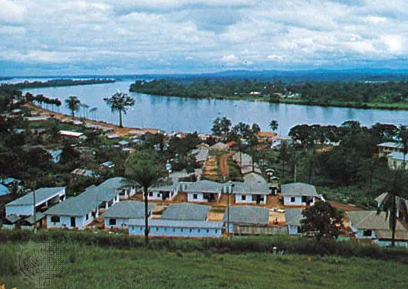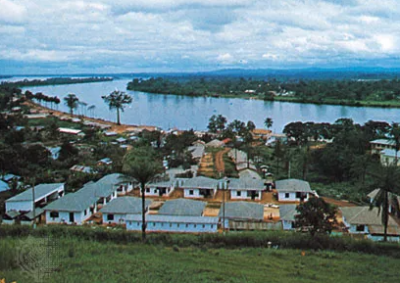The Gabonese Republic is located in West-Central Africa. It is bordered by the Gulf of Guinea to the west, Equatorial Guinea to the northwest, Cameroon to the north, and the Republic of the Congo to the east and south. Its area is approximately 270,000 km² and its population is estimated at around 1,500,000 people. The capital and largest city is Libreville. Since gaining independence from France on August 17, 1960, Gabon has been ruled by three presidents. In the early 1990s, Gabon developed a multiparty system and enacted a new democratic constitution that allowed for a more transparent electoral process and reformed many governmental institutions. The small population density, combined with abundant natural resources and foreign private investment, has made Gabon one of the more prosperous countries in the region, with the Human Development Index being the highest in Sub-Saharan Africa.
### Origins of the Name
The name Gabon comes from "Gabão," which means "cloak" in Portuguese, referring to the shape of the Komo River's mouth at Libreville.
### History
The first inhabitants of the area were the pygmies, but with the migration of the Bantu people to the region, the latter eventually replaced them. There are currently many tribal groups in the country, the largest of which are the Fang people, accounting for 25% of the population. The first Europeans (the Portuguese navigator Diogo) arrived in the region in the 15th century. The country's current name derives from the Portuguese "Gabão," which is itself derived from the Arabic word "قَبَاء" (qaba), meaning the same thing and resembling the mouth of the Komo River at Libreville. The Dutch arrived in the region in 1593, while the French came in 1630. French explorer Pierre Savorgnan de Brazza led his first expedition in the Gabon and Congo regions in 1875, establishing the city of Franceville and later became the colonial governor. Several Bantu groups were living in what is now Gabon when France officially occupied it in 1885, and it became an autonomous republic within the French Union after World War II.
In 1910, Gabon became one of four territories in French Equatorial Africa, a union that lasted until 1959. These territories gained independence on August 17, 1960. Gabon’s first president, Léon Mba, was elected in 1961 while Omar Bongo Ondimba was vice president. French interests were crucial in determining the future leadership in Gabon after independence, with French funds flowing into Mba's successful election campaign. After Mba came to power, he suppressed the press and banned political demonstrations, imposing restrictions on freedom of expression and gradually excluding other political parties from power. The constitution was amended to align with French preferences centralizing power in the presidency held by Mba himself. However, Mba dissolved the National Assembly in January 1964 and imposed a one-party rule. A military coup attempted to overthrow him and restore parliamentary democracy. Mba’s dictatorial regime became synonymous with "French interests," culminating in the deployment of French paratroopers within 24 hours to restore him to power. After days of fighting, the coup was quashed, and most opposition members were imprisoned despite widespread protests and riots. The French government showed no concern over international condemnation of their intervention and kept paratroopers stationed in Douala on the outskirts of the Gabonese capital. When Mba died in 1967, he was succeeded by Bongo, who remained in power until his death in 2009.
In March 1991, a new constitution for the country was adopted, which included provisions for a Bill of Rights and the establishment of a body to ensure those rights (the National Council for Democracy) alongside a governmental advisory council to deal with economic and social issues. Multi-party legislative elections were held in 1990-1991, although opposition parties were not legalized. President Omar Bongo Ondimba held office from 1967 until his death in June 2009, having been re-elected for three consecutive seven-year presidential terms, the last of which came on November 27, 2005, where, according to figures from the Gabonese Ministry of the Interior, he secured 79.1% of the votes. After Bongo's death, Rose Francine Rogombé, the president of the Senate in Gabon, succeeded him.
### Gabon’s Constitution
The voting age in Gabon is 21. In 2003, the president amended Gabon's constitution to remove any restrictions on the number of presidential terms. The president retains significant powers such as the authority to dissolve the National Assembly, declare a state of emergency, delay legislation, call referenda, and appoint or dismiss the prime minister as well as members of the cabinet. According to provisional results, the ruling Gabonese Democratic Party won 84 out of 120 seats in parliament. On September 3, 2009, Ali Bongo, son of Omar Bongo, was elected president. As in previous elections in Gabon, opposition parties contested the results, and there were calls for a boycott along with accusations of election fraud and bribery. The announcement of the results led to riots and the looting of the French consulate in Port-Gentil. However, many international observers, including the Economic Community of Central African States, stated that the elections "met international standards" for democratic voting and urged the Gabonese people to accept the outcome.
Gabon has a small professional military of around 5,000 personnel divided into the army, navy, air force, gendarmerie, and national police. The mission of the Gabonese forces is to defend the country, and they are not trained for offensive roles. There is also a force of 1,800 men to protect the president. In September 2007, government spokesman René Ndémizô Oubiang announced that the cabinet had decided to officially abolish the death penalty, which had not been applied in the country for over a decade. On January 7, 2019, a group of officers announced their coup against President Ali Bongo Ondimba, preventing the broadcast of his New Year's speech and announced the formation of a National Council for Reform amid gunfire in the capital Libreville. After a few hours, the involved officers were arrested, and the Gabonese government declared the coup attempt a failure.
Gabon ranked 21st out of 53 African countries in the Ibrahim Index of African Governance in 2009. The Ibrahim Index is a comprehensive measure of African governance based on various variables reflecting governments' success in providing essential political goods to their citizens.
### Geography
Gabon is located on the Atlantic Coast of Central Africa, straddling the equator, and has an equatorial climate with a wide array of rainforests covering 85% of the country. There are three distinct zones: the coastal plains (ranging 2-30 km from the ocean shore), the mountains (the Crystal Mountains northeast of Libreville, and the Shelo Massif in the middle where its highest peak is Mont Ibondji at 1575 m), and the savanna to the east of the country. The coastal plains form a large part of the World Wildlife Fund's Atlantic coastal rainforests ecological zone and contain pockets of mangrove forests in Central Africa at the mouth of the Muni River on the border with Equatorial Guinea.
The largest river in Gabon is the Ogooué, which is 1200 km long. Gabon has three karstic areas where hundreds of caves are found in limestone and dolomitic rocks. These include the Grotte de Lastourville, Grotte de Libamba, Grotte de Bongolo, and Grotte de Kisibogo, with some caves still being undiscovered. A National Geographic team visited the caves in the summer of 2008. Gabon's international borders stretch 2551 km, with its borders with Equatorial Guinea (350 km), Cameroon (298 km) to the north, and the Republic of Congo (1903 km) to the west and south. Gabon's territorial waters extend 22 km into the Atlantic Ocean.
### Economy
Gabon is more prosperous than most neighboring countries, with per capita income four times higher than the sub-Saharan African average. This is largely due to oil production. Critics argue that oil revenues do not contribute to modernizing or diversifying the Gabonese economy, which still heavily relies on its natural resources. Gabon was a full member of OPEC from 1975 to 1995. It is also a source of iron manganese and timber. Uranium mines near Franceville were closed in 2001 due to new competition in the global market, and current efforts are focused on reopening them. There are also ongoing efforts to exploit iron mines located northeast of Makokou starting in 2012.
During the 1990s, the decline in the value of the West African Franc caused Gabon to struggle with repaying its external debts. France and the International Monetary Fund provided more loans and aid in exchange for implementing economic changes. Gabon's main trading partners are the United States, China, and Russia for exports, while most imports come from France.
### Tourism
Gabon is small in size and lies on both sides of the equator along the west coast of Central Africa, sharing borders with Cameroon, Equatorial Guinea, and the Republic of the Congo. The country is rich in wildlife, with tropical forests covering 85% of its area and a low population density. In addition to the forests, the savanna, mangrove trees, lakes, and beaches create an ideal habitat for various animal and reptile species, including 20,000 western lowland gorillas, 60,000 forest elephants (the most numerous in the continent), and 700 species of exotic birds.
Gabon possesses immense oil wealth, having discovered many oil reserves near the capital Libreville in 1931, making it one of the top five crude oil producers in Sub-Saharan Africa, according to data from the U.S. Energy Information Administration. Gabon officially returned to the Organization of the Petroleum Exporting Countries (OPEC) in 2016, after being a previous member from 1975 to 1995, having temporarily left due to high annual fees, according to a previous report from Asharq Al-Awsat. Gabon's natural gas production reached 454 million cubic meters by the end of 2021, up from just 80 million cubic meters in 2010, according to OPEC's annual report. It has 26 billion cubic meters of confirmed natural gas reserves by the end of 2021, most of which are found in oil fields. The Gabonese government relies heavily on revenues from crude oil, which, along with other liquid revenues, accounts for approximately 45% of the country's GDP. Gabon's oil and liquid exports constituted nearly 79% of total export revenues during 2021.




